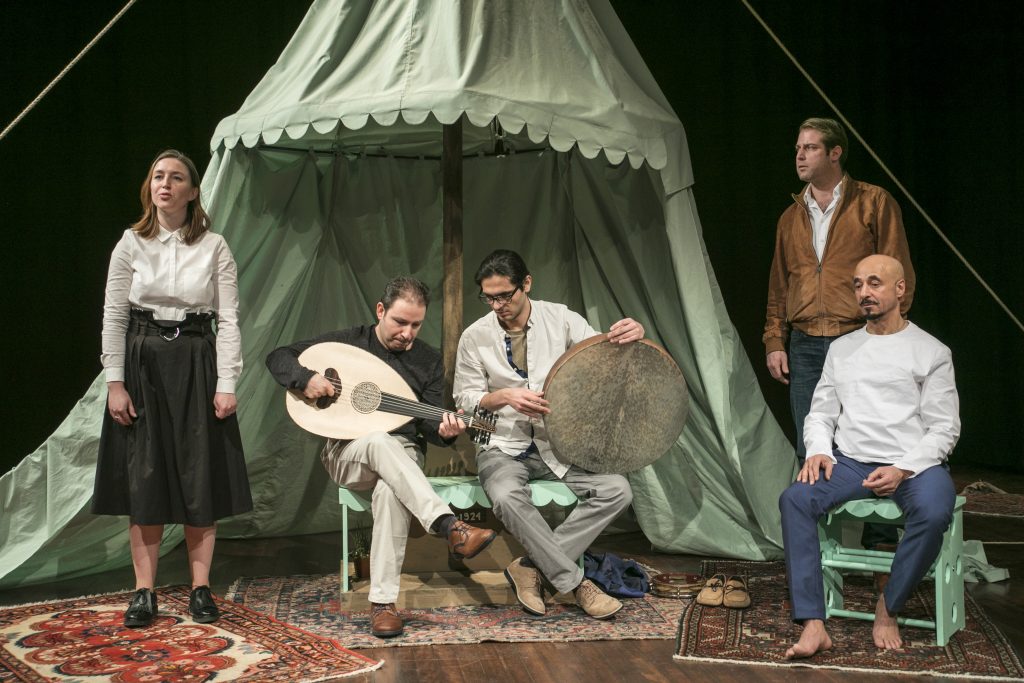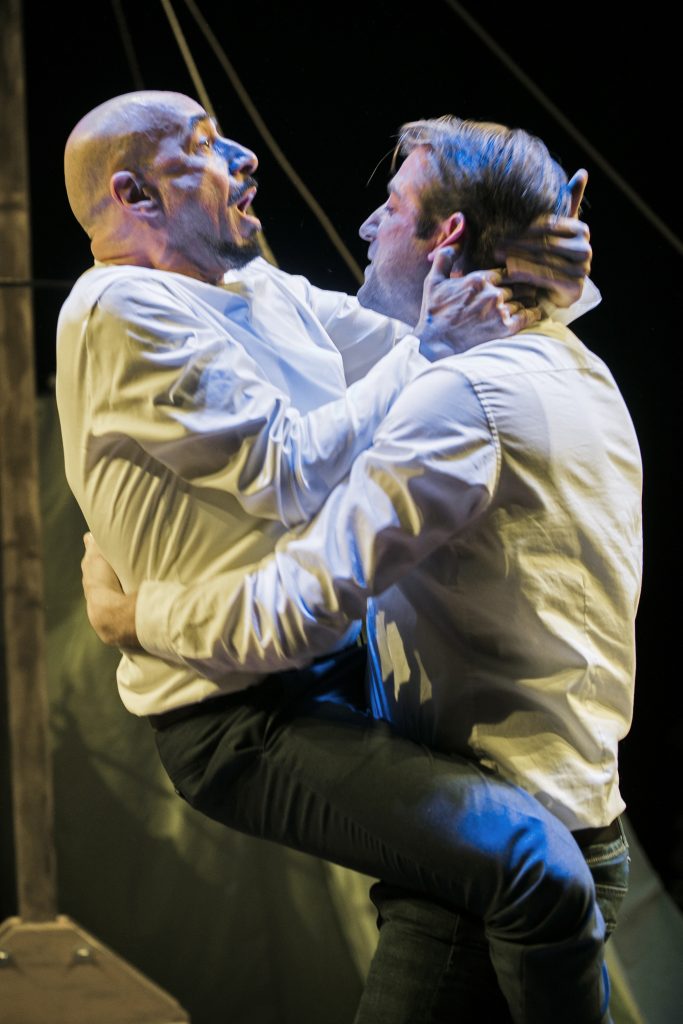Ik las de biografie van Jacob Israel De Haan, Unrest, door Jan Fontijn. Schrijver en regisseur Gerardjan Rijnders baseerde Salaam Jeruzalem op deze biografie. Het is deze toneeltekst, gespeeld door De Nieuw Amsterdam, die me pas echt laat beseffen hoe dringend het is zo’n bijna vergeten figuur als De Haan te laten spreken.
Jacob Israël De Haan kegelde taboes omver, vocht hartstochtelijk voor een eerlijker en rechtvaardiger wereld en moest dat met een gewelddadige dood bekopen. Een spannend leven. Bijna niemand weet meer wie hij was. Ondanks de straat in Amsterdam die naar hem is vernoemd. En ondanks het prachtige citaat van hem op het homomonument: ‘Naar vriendschap zulk een mateloos verlangen’. Maar heeft een 21ste-eeuwer nog een boodschap aan dichter/journalist Jacob Israël de Haan (1881 – 1924)?
Humor en smeuïge theorieën
Rijnders hanteert humor en een lichte toon. Dat is op zichzelf al verrassend bij zo’n gekwelde en onstuimige levensgeschiedenis. Hij trekt ook allerlei lijnen naar het nu en laat er verhelderende, vaak smeuïge theorieën op los. Zo zorgt hij ervoor dat De Haan sprankelend genoeg is om onze aandacht te trekken en ons vervolgens de ogen te openen voor hoe onverschillig wij in onze tijd met elkaar omgaan.
Kooktemperatuur
We leven in een hype van instant meningen, die we elkaar op kooktemperatuur toeslingeren. Het lijkt of we niet meer het geduld hebben naar elkaar te luisteren. Laat staan dat we nog op zoek gaan naar wat iemand die een eeuw geleden leefde ons zou kunnen leren.
Briljante tekst
De Haan liet in zijn opvattigen niet alleen zijn scherpe verstand spreken, maar ook zijn gevoel. Daarin is hij een man van onze tijd. Maar anders dan velen nu wist hij precies wat voor keuzes hij maakte, ook al switchte hij nogal eens in de loop van zijn leven. Zijn joodse jeugd, het socialisme, zijn botsing daarmee, zijn homoseksualiteit en de vanzelfsprekendheid waarmee hij daar openlijk over schreef (anno 1904!), de zionistische strijd voor een joodse staat in Palestina en de orthodox gelovige partij die juist nog wilde wachten met het vestigen van die staat. Dit zijn de episodes uit De Haans leven. Rijnders verwerkt ze allemaal in zijn briljante tekst.
Wikipediamomentje
Als je een voorstelling maakt over iemands leven, ligt altijd het gevaar op de loer van een schoolse opeenvolging. Ook Rijnders ontkomt daar niet aan. Maar hij geeft er een komische draai aan door zo’n opsomming juist als karikatuur op te voeren. Een ‘Wikipediamomentje’ noemen de personages in Salaam Jeruzalem dit. Zo leidt de voorstelling je vanzelf naar echte interesse in de betekenis van De Haans leven.
Al pratend een tent opzetten
At Salaam Jeruzalem krijgt dit levensverhaal vorm in een gesprek tussen acteurs Randy Fokke, Sabri Saad El Hamus en Ludo van der Winkel. Telkens stappen ze tijdelijk in de rol van de schrijver en de personen die hem in zijn leven omringden. Al pratende zijn ze bezig een tent op te zetten en een tentdoek te strijken.
Doordrenkt van fallische symbolen
Vanaf het begin is de voorstelling doordrenkt van fallische symboliek en homo-erotische verlangens. Terwijl de vrouw een uiteenzetting geeft over de sporen die de Alfaman over de hele wereld verspreidt, houden de twee heren zich uitvoerig bezig met het oprichten van een dikke tentpaal. Deze erotische lading, met een flinke vleug sadomasochisme, is tekenend voor het hoofdpersonage. Ook als hij zich met rationele zaken bezighoudt. Wat dreef De Haan ertoe naar Rusland te gaan om daar het zware lot van mannen in gevangenissen te onderzoeken? Waarom hechtte hij zoveel waarde aan een goed contact tussen joden en Arabieren? Dit laatste is een waardevol inzicht, waar we ook nu nog veel van kunnen leren. Maar dit engagement wortelde ook in de schoonheid van Arabische mannen en de relaties die De Haan met hen aanknoopte.

Afstandelijk
Zeker in de eerste helft van de voorstelling, over de Nederlandse jaren van De Haan, blijft het spel wat afstandelijk. Dat is jammer. Het leven van De Haan was onstuimig. Daar wil ik dan ook wel wat van voelen. De passie zit meer in de woorden dan in het spel. Hoe mooi het eindbeeld van de tent ook is, met twee Arabische muzikanten (Nizar Rohana en Modar Salama) en hun fijngevoelige muziek, het omslachtige opbouwen en telkens toch maar weer neerhalen van de tent leidt vaak af van het verhaal. Juist omdat het opzetten zo breed is uitgesponnen, verliest deze handeling haar spanning en wordt zij hinderlijk. Je weet al ruim van tevoren wat het eindresultaat zal zijn.
Politieke twisten en een heftig liefdesleven
Ook in het tweede gedeelte, als De Haan in Palestina is, voel ik niet de gedrevenheid die ik me bij zijn leven voorstel. Hij stortte zich in politieke twisten en in een heftig liefdesleven. Met welbewust fatalisme ging hij zijn dood tegemoet. Zelfs als de mannen op het toneel elkaar krachtig zoenen en zich storten in SM-seks, voel ik niet de zindering van De Haans leven.

Echt gedreven
De echt gedreven schreeuw komt pas als Ludo van der Winkel losbarst in een tirade tegen de social media met hun oppervlakkige, één-regelige oordelen, onberedeneerde haat en leugens. Met telkens maar weer dat irritante ‘Vind ik leuk’ ertussendoor. Het schudt je wakker, al die losse momentjes: wat een goedkope manier om de wereld te lijf te gaan. Vergelijk dat eens met de doorvoelde kritiek die De Haan uitte. Met zijn diepgang tot hij niet dieper meer kon. We verdrinken in een zee van destructiviteit. We zeggen van alles zonder echt te weten wat we zeggen. En het erge is dat dat blind maakt voor de meest simpele, kalme waarheden. Sabri Saad El Hamus is een Egyptisch acteur, die hier in Nederland wil zijn, gewoon om te kunnen spelen en zingen.
